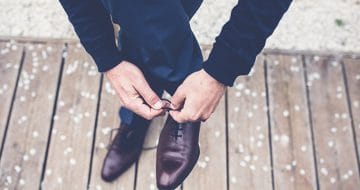Blogging barrister compiles handy guide to advocates’ etiquette

No brown shoes, don’t shake hands and never turn your back on the judge — you may know all there is to know about the law, but being a barrister also comes with plenty of less than obvious rules of etiquette.
Following a lively Twitter debate about the dos and don’ts of life at the bar, family lawyer Lucy Reed has helpfully compiled the “unspoken rules” on her Pink Tape blog.
Reed says that while most of these “idiosyncratic mannerisms of the bar” are outdated, a few are worth newbies paying attention to.
Many of the unspoken rules focus on dress and deportment. Brown shoes are a big no-no, Reed reckons — as are brown suits. Shirts should be white, not coloured.
Whatever the hue, those wearing suits should “DEFINITELY never take your jacket off in court unless specifically invited to by the judge”. Bands and robes shouldn’t be worn outside court.
Whether to sit or stand while addressing the judge is, Reed says, “pretty straightforward”: stay seated if in front of a magistrate or district judge, but “stand for anything else”. Overall, though, “as long as you stand when the judge comes in and when the judge stands up you’ll be fine”.
It’s also not done to turn your back on the judge when leaving the court. Barristers are expected to “exit with a bow and backward” instead.
Reed’s post was prompted by a tweet from fellow family barrister Rhys Taylor of 30 Park Place and The 36 Group.
During my pupillage (1996) I was taught:
1. Do not eat when walking back to chambers.
2. Don’t take your jacket off in front of solicitors, even when in the pub.
3. Never drink beer from the bottle.
4. Counsel do not take their bags into court.
To what extent have we moved on?— Rhys Taylor (@RhysTaylor32) September 13, 2019
Taylor’s tips sparked fierce debate, with lawyers agreeing that they are by and large outdated. Barristers traditionally don’t shake hands with one another either, but it’s unlikely that you’ll be pulled up on that today. Nor is it likely that a judge will take umbrage at the exact shade of your suit.
There was a time where you might turn up at court on a case worth millions that had taken years to come to trial and the judge might decide your suit wasn’t dark enough and would say they couldn’t hear you. #IDontMissThoseDays
— Seán Jones QC (@seanjonesqc) September 14, 2019
It was all much stuffier back in the day, though. The prize for most outlandish rule of etiquette goes to the criminal lawyer who was not supposed to look their head of chambers in the eye — probably not something to worry about in even the fustiest set today.
I was told, as a pupil, in 1992 not to look at my head of chambers and to turn to face the wall if I saw him approaching. #timeshavechanged
— Jane (@Jawapu) September 13, 2019
While most of the supposed rules are no longer essential, it’s worth being aware of which ones might trigger a particularly fussy senior practitioner. Reed’s advice to pupils is to “follow them if you can — whilst still junior at any rate — later on you can make a judgment call about which ones really matter”.
As for solicitors, Jon Armstrong pointed out that there’s only really one rule: never wear brown shoes.
You barristers live in a world of Dickensian formality compared with us solicitors. All I remember being taught was never wear brown shoes. Do you still refuse to shake hands?
— Jon Armstrong (@JonArmstrongLaw) September 13, 2019


